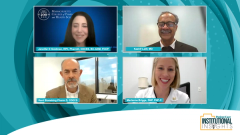
Key Takeaways and Clinical Pearls for the Utilization of Teplizumab
A panel of experts in the management of diabetes share their key takeaways and clinical pearls for the utilization of teplizumab for the delay of onset of type 1 diabetes.
Episodes in this series

The following transcript has been lightly edited for clarity and style.
Dr. Jennifer Goldman: So let's ask another question and we'll start wrapping it up. What factors do you consider when selecting the infusion site for administering teplizumab? We asked that poll earlier about who has given teplizumab, and the answer was actually none. What would you consider? And where's your infusion site? Marianne, where are you?
Marianne Briggs: We did it in the clinic. So we are extra lucky.
Dr. Kashif Latif: I think that the process sounds daunting, but it's not really. We are privileged that we have an outfit that comes in and does our infusion lines, which we typically use the midline. You can have a PICC line, you can have peripheral IV for these patients. And these patients are really, ones who want to do it, they have a good understanding of what they're going for. It's just like buying a life insurance or a disease insurance policy. And so I think that we have a good buy-in for all this stuff, but getting all this thing done and set up is not difficult. But there are a lot of centers in the country already who have gone to.
Dr. Jennifer Goldman: What about in your area where you are? Other than going to your office, are there centers around at your infusion centers?
Dr. Kashif Latif: I think in Tennessee we have two or three. But now there are infusion centers who can do this, but you do need to have some kind of an oversight. And so if you don't have an endocrinologist or somebody partnering and making sure that the- Infusion center is not going to stop or change infusion because of lymphopenia, because they're just infusion centers. So I think that we have to have a slightly better understanding and navigate the treatment for patients accordingly.
Dr. Jennifer Goldman: So did you find this discussion helpful? And it's interesting, my slides aren't matching the polls that are going up. So let's do the poll that's up rather than the slide. What factors do you consider when selecting the infusion site? So why don't we close that one and go to the next one. Maybe. I want to make sure we have some time for wrap up and then we'll hang around for some questions. Was this helpful at all? Was this discussion helpful for you to understand really the staging, the staging, the screening, and that we have management available? So most found it helpful. And what was the key insight you gained from this discussion regarding type one staging and management? Well, people are answering that one of the questions that came in was about fertility and any side effects on fertility. And so if this was being studied, you are involved 15 years ago. Or this has been studied for years and years, it's not like it just was studied. Any information on fertility impact?
Dr. Kent Stoneking: So the recommendation is to prevent pregnancy from the time that the therapy is first prescribed and then treatment is mapped out. And you enter an area where you're now having to work with the payer. In our case, our 57-year-old female, it took six months from the time that Marianne identified this patient as a good candidate for treatment in clinic and the time that it was actually approved and we could start treatment. So between the time that this patient is identified as a good candidate and agrees to pursue this treatment option. Until at least 90 days after that treatment is complete, we recommend preventing pregnancy.
Dr. Kashif Latif: So just like any biologic, you want to be careful because with the biologics, we don't want to. If we all know that during pregnancy, mother nature actually suppresses the immunity to start with, so we can take care of a foreign body in our body. And so we really need to be careful as far as that is concerned.
Dr. Jennifer Goldman: Well, I'm going to give you one last opportunity. So I'm going to ask you about your key messages you want to convey to anyone listening here. So what points you want to leave everyone with. But I want to thank you all for this panel and this really informative discussion. And we know that lifetime risk of developing stage three type one approaches 100% when two or more antibodies are present. So you have made it very clear of why early intervention is critical. So with that, thank you everyone. Any final thoughts or key messages you'd like to get out, Dr. Stoneking?
Dr. Kent Stoneking: Just want to thank you for this opportunity. I did notice just on a personal note, there is a physician who's asking several questions. Dr. Tim Fultz, greetings. Dr. Fultz, we know each other. I was actually Dr. Fultz's patient in primary care quite some time ago. So great to see Dr. Fultz on the program this evening. And please wish Joyce well as well, great to see you. This has been fantastic discussion. I'm so glad as a pharmacist to be able to contribute to a discussion like this because there are medical considerations. But from a pharmacy standpoint, as Dr. Latif referred to, this is a biologic drug and biologic drugs require a lot of extra special handling. In this case, the dosing is very carefully calculated. It's dosed based on body surface area, almost like some of your chemotherapeutic agents. And then scaled up regularly over a five-day period and then maintained. The infusion rate, we didn't even refer to that, but the infusion rate has to be timed as well. So we very carefully made sure that our infusion lasted at least 30 minutes per the package insert. And then monitoring our patient throughout the infusion, but also in between infusions. And just having those ongoing conversations and making sure that that patient knows that they're at the very center of this process. And if they have a specific request, we do all that we can to meet that request while providing the therapy and guiding them through the process.
And then the messaging around the prospects of that therapy and what it might offer in terms of delay and they're actually set. You know what, I think we had what, Marianne, one patient or two that, at least one that I know of that never went on insulin that was in the study. Is that right?
Dr. Jennifer Goldman: Marianne, you have any last thoughts you'd like to share?
Marianne Briggs: I think one thing that might be helpful for primary care is that TrialNet screening tools, those are for free. So I would recommend getting a few and to have them in your clinic. And then if you're talking with patients, gathering their family history and you notice, oh, you have a family history of type one. You're thinking that, use that, it's something you can just give to them, it's free, very easy to do. And that can then if you realize, I'm doing this, you can order a few more. I think that would be helpful in finding these people.
Dr. Jennifer Goldman: You can order that as an office. It's not the patient and have them right on site, that's amazing. That's a great-
Dr. Kent Stoneking: That's really the best way to do it. We have them plenty in our office and we'll hand them to patients as needed. We use a company called Enable Biosciences, and as Marianne mentioned, they don't cost us anything. We turn them over to the patient and then the patient, we keep track of a code. There's a kit code for every one of those tests so we can track [01:03:00] the results as they come through in HIPAA compliant fashion. But then it's up to the patient, it's a finger stick, five drops on a card, they mail it back in, include a photocopy of their insurance card. And it is very self-explanatory, very easy to use.
Dr. Jennifer Goldman: Excellent. Dr. Latif, last but not least, what are your closing thoughts?
Dr. Kashif Latif: We are entering a new era. It used to be that JDRF's goal was to cure diabetes, but now the messaging has changed to prevent type one diabetes. And so it takes a little work to go around that message because yes, type two you say it's lifestyle diet management, but type one, my goodness. So we are really at a cusp of a new era. We need all the support from all of our peers, all of the people that we work with. They refer to us, we take care of their people and all. And so I think it's just awareness, we really have to. If I were to quantify screening in our country right now is less than 1%. And I guess how many people we can really reach and change their lives? And so I think it's just, yes, it is more work, it is not all the process are there. So we are trying our best in our community to make sure that it is easy for our patients as well as their loved ones and families to think about it, refer, as well as all the referring providers and everybody taking care of patients in the community so that we can propagate this further.
And so I'll leave you with this last message again one more time, I've said this earlier. When somebody in anybody's family get diagnosed with type one diabetes, life as we know it is changed, it is not the same. But can we make a difference? Yes, now we can. So we just need to have our antennas up and look for those people and just have an idea. I appreciate everybody who's on it. And hello, Tim. So good to see stuff from you today, I really appreciate it. But I think the messaging is in a primitive stage, we have to get it to everybody so we can have the impact that the condition deserves.
Dr. Jennifer Goldman: So primary care is already screening all kinds of preventative health, right? So it's just one more, but certainly you have very well identified who should be screened. So I thank you all very much, and I thank you all for participating.
Newsletter
Enhance your clinical practice with the Patient Care newsletter, offering the latest evidence-based guidelines, diagnostic insights, and treatment strategies for primary care physicians.

































































































































